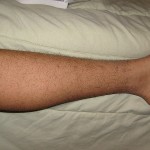Restless leg syndrome a harbinger of heart disease, new study reveals
Restless leg syndrome has been dismissed by some as a nuisance or a minor neurologic health problem. Yet, the condition affecting nearly one in ten Americans may indicate a more serious problem -- heart disease.
According to a new study conducted by the Mayo Clinic for the National Heart, Lung and Blood Institute, people with restless leg syndrome also tend to have thicker heart muscles than the general population. This puts this group at a higher risk for heart attacks, stroke and sudden cardiac death.
Participants who had the most number of leg twitches during the sleep study were found to have thicker hearts on diagnostic tests, and were twice more likely to have died or developed a heart problem three years later.
The study authors are quick to point out that what they found was not a cause-and-effect relationship, but rather a suggestion for clinicians to closely consider heart disease in patients with restless leg syndrome.
Sufferers of this condition also tend to have sleeping problems, including sleep apnea, which is also linked to heart disease.
The primary cause of restless leg syndrome is said to be genetic. Other theories blame problems with the body's dopamine and iron system as well as other diseases like diabetes, thyroid problems and auto-immune disorders. Some medications are also implicated by other studies in restless leg syndrome.
Some doctors have said that pharmaceutical companies wanting to sell more restless leg syndrome medication have made the focus on the condition overblown, as the condition is in itself not life-threatening.
However, the new Mayo Clinic study linking the condition to heart disease may prompt clinicians and patients to factor in the findings in restless leg syndrome treatment.
